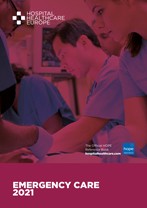The National Institute for Health and Care Excellence (NICE) has made revisions to its original COVID-19 rapid guideline: managing COVID-19 (NG191) that was originally produced in March 2021 to take account of emerging evidence on the effectiveness of different therapies and, in particular, patients who are hospitalised with the virus.
NICE has recommended the use of the combination of two monoclonal antibodies, casirivimab and imdevimab, known as Ronapreve, REGEN-COV or REGEN-COV2, to all patients aged 12 years and hospitalised due to COVID-19. Eligible patients are those who have no detectable COVID-19 antibodies (i.e., are seronegative)1 but the combination therapy should not be given to individuals who are seropositive and those whose COVID-19 serostatus is unknown.
Casirivimab and imdevimab is a neutralising monoclonal antibody combination that binds to two different sites on the COVID-19 spike protein and in doing so, prevents entry of the virus into host cells, thus inhibiting viral replication. The evidence for Ronapreve and which was used by NICE to make its latest recommendations, came from data in the RECOVERY trial undertaken by researchers at Oxford University and the results of the trial are available as a preprint.2 The study enrolled 9785 patients hospitalised with COVID-19 and who were randomised 1:1 to a single dose of intravenous casirivimab (4g) and imdevimab (4g) (n=4839) and compared with a group assigned to usual care (n=4946). Since the trial recruited patients across 127 hospital sites throughout the UK, the definition of usual care varied but included corticosteroids (94%), aspirin (28%), remdesivir (25%), colchicine (23%) and tocilizumab or sarilumab (16%). For the trial, the mean age of participants was 61.9 years (63% male) and 54% were seropositive at the point of randomisation. The primary outcome was 28-day all-cause mortality.
Study outcomes
In terms of the primary outcome, overall mortality was not significantly different between those assigned Ronapreve or usual care (relative risk, RR = 0.94, 95% CI 0.87–1.02) and with seropositive individuals (RR = 1.07, 95% CI 0.94–1.22). However, for seronegative patients, there was a significant mortality benefit (RR = 0.82, 95% CI 0.73–0.92).
In addition, there was a reduction in the number of seronegative patients progressing to invasive mechanical ventilation and the median duration of hospital stay was reduced from 17 days (usual care) to 13 days.
Based on the evidence from this single trial, the NICE panel agreed to recommend casirivimab and imdevimab to hospitalised seronegative COVID-19 patients aged 12 and over. A recognised limitation of the RECOVERY trial noted by NICE was that there was a lack of data on different doses of casirivimab and imdevimab, among immunocompromised patients and those who had been vaccinated. An additional problem was that safety outcomes were not collected throughout the study and NICE concluded that the safety profile of the combination is yet to be determined. Despite these limitations, the panel agreed that Ronapreve should be used for all eligible patients.
References
- NICE. COVID-19 rapid guideline: managing COVID-19. NG191. www.nice.org.uk/guidance/NG191 (accessed October 2021).
- RECOVERY Collaborative Group. Casirivimab and imdevimab in patients admitted to hospital with COVID-19 (RECOVERY): a randomised, controlled, open-label, platform trial. MedRxiv 2021 doi: https://doi.org/10.1101/ 2021.06.15.21258542





